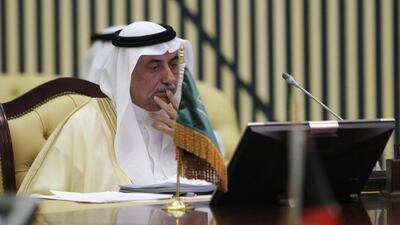Riyadh // Saudi Arabia on Monday sacked its veteran finance minister as the kingdom undergoes a major economic restructuring because of lower oil revenues.
Ibrahim Al Assaf “has been removed from his position”, said a royal decree, one of a series of orders from King Salman, published by the official SPA news agency.
Mr Al Assaf was replaced by Mohammed Al Jadaan, head of the Capital Market Authority which regulates the stock market. Mr Al Assaf, who is 67 years old and had held the post for 20 years, was reassigned as a minister of state and will remain in the cabinet.
Mr Al Jadaan, a lawyer, had led the Capital Market Authority since January last year said on Tuesday he had great confidence in the kingdom’s economic vision despite all the challenges it faces.
“My confidence in God is great, and then the guardian [the king], at this blessed state’s launch towards broader horizons of growth and financial, economic and social prosperity,” he said.
No replacement for him at the market regulator was immediately named.
The finance portfolio was the only cabinet position changed under the royal decrees which also replaced the heads of several agencies including the Saudi Food and Drug Authority.
Since 2014, global oil prices have collapsed by about half, accelerating Saudi efforts to move away from petroleum, which still accounts for the bulk of government income.
The world’s biggest oil exporter is projecting a budget deficit of US$87 billion (Dh320bn) this year.
It has taken a series of austerity measures, including subsidy cuts, reductions in cabinet ministers’ salaries and delays in major projects.
Earlier this year, deputy crown prince Mohammed bin Salman, 31, who heads the main economic coordinating body, announced a wide-ranging plan to move the economy away from oil.
Mr Al Assaf said last week Saudi Arabia’s financial position remains strong despite sinking oil prices, although there is “some pressure” on bank liquidity.
“We have been able to maintain a good position in public finances,” he said.
Among measures to cover the fiscal gap, Riyadh has drawn on its foreign reserves and issued domestic bonds before Mr Al Assaf supervised the kingdom’s first international bond offering two weeks ago. It raised $17.5bn, reflecting strong global interest.
Official figures show the kingdom’s reserves declined to $562bn in August from $732bn at the end of 2014.
Oil prices are hovering around $50 per barrel after hitting a 10-year low of less than $30 in January, down from a peak of more than $100 in mid-2014.
Prince Mohammed announced Saudi Vision 2030 in April to overhaul the kingdom’s economy and government. A cabinet reshuffle in May replaced long-time oil minister Ali Al Naimi as well as other top officials but left Mr Al Assaf in his position, making him the longest serving minister in the kingdom.
Mr Al Assaf was one of three officials who appeared on a popular Saudi talk show this month to defend recent austerity measures implemented by the government. The ministers’ performance was criticised by many Saudis who said they were unconvinced.
* Agence France-Presse, Bloomberg and Reuters

